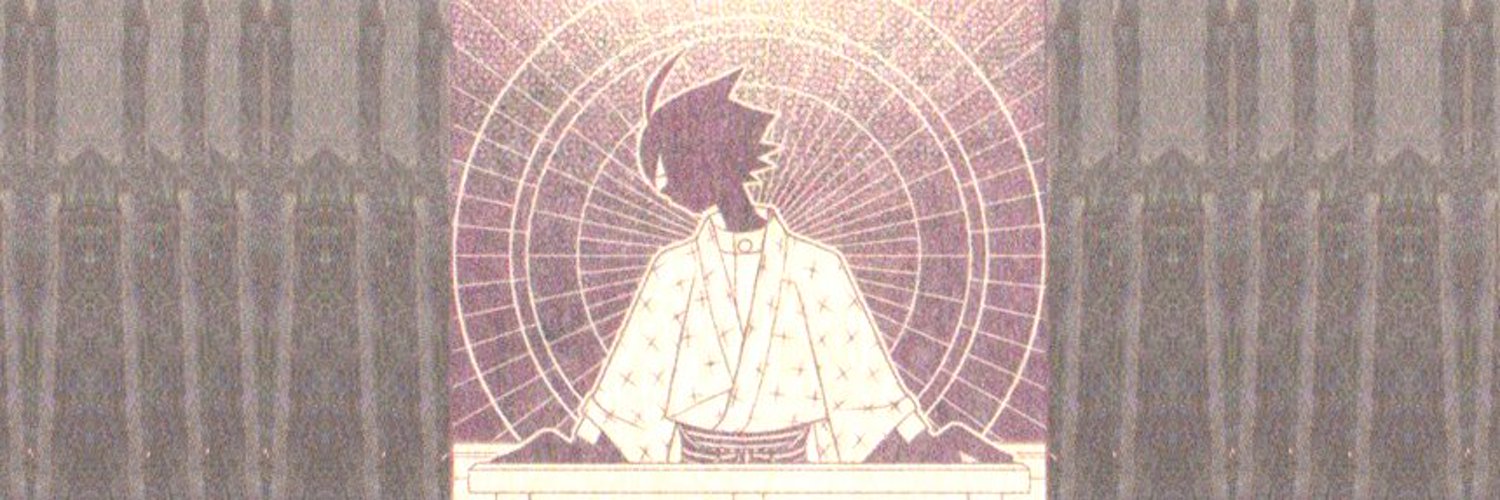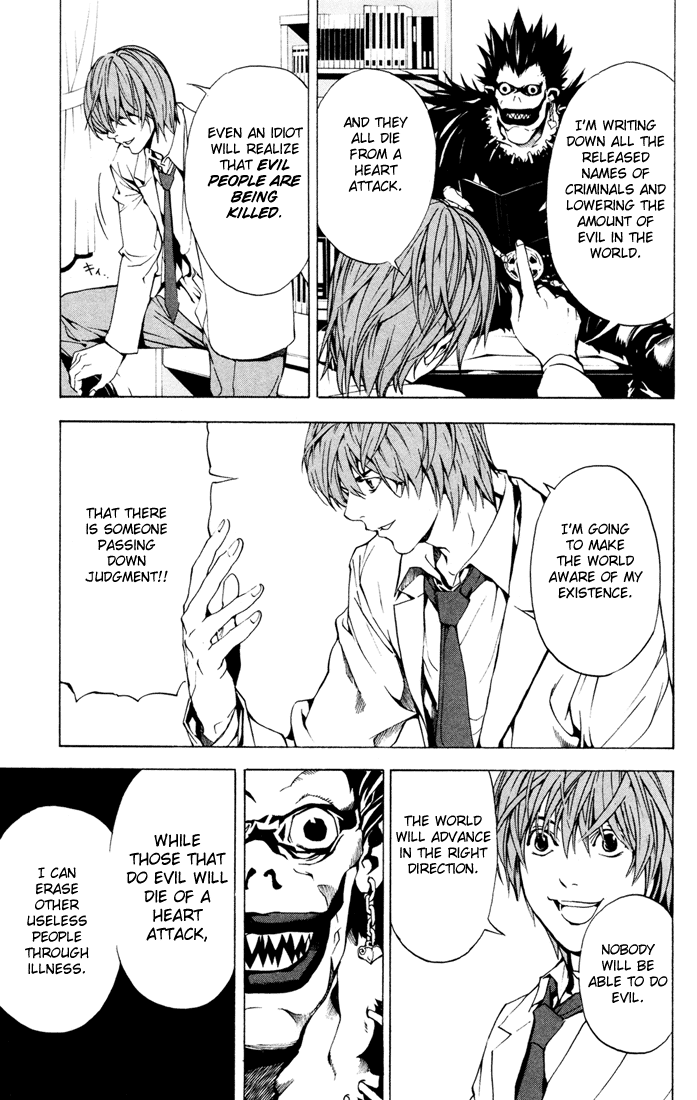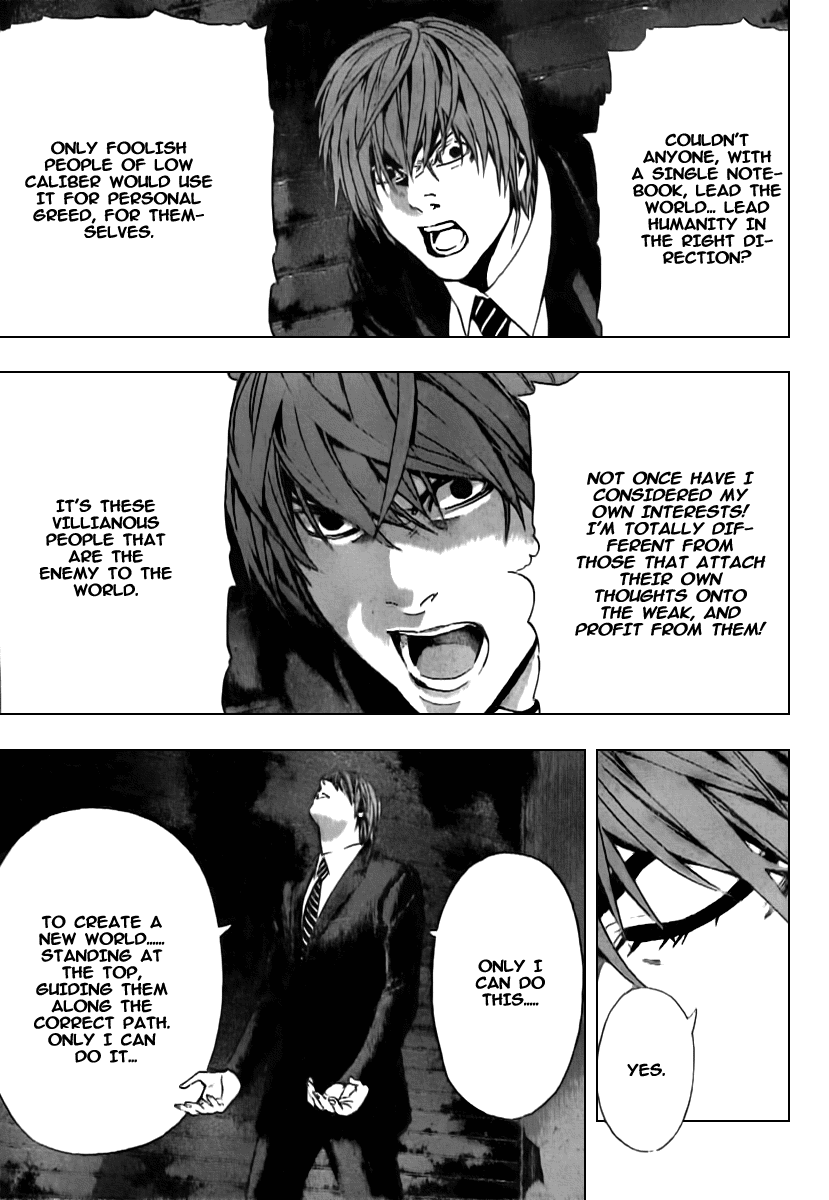

| Main
Page |
Articles |
Translations |
"Because
I
was bored"
So,
in
the end, was it a captivating story? Yes, it absolutely
was. It occupied my thoughts wholly while reading it, and
then it kept me occupied for at least for a good few weeks
afterwards.
Though
I
actually do want to say it that ultimately, I was
disappointed in how little it dwelt on the philosophy of
the note itself. As much as the popular image of the manga
rests on the few chats and L and Light have over the
course of their dealings with each other as both friends
and enemies, the contents of said meetings are mostly
pragmatic in nature both from the perspective of the
characters and the story’s progress itself. Light and L
never really discuss what makes the two of them tick,
there’s never really an argument.
Most
likely
because the lines in the sand are clear. Everybody knows
which side they are on, and nobody will waver in their
faith, not even in the final moments of the great
showdown. They don’t discuss morality and ethics because
there’s nothing to discuss. The decision is made to use
violence to resolve their philosophical differences, the
actual discussion is therefore the plot of the manga and
the actions the protagonists take over the course of it.
But
I
think it’s worth mentioning that throughout the twelve
volumes of the manga, Light’s position is illustrated not
only by his actions, but also in the context of the
actions of others. He is the mastermind of the plot, but
at least two other people get some agency with the note,
illustrating how Light’s approach to killing/culling is a
sort of “golden mean” even if his position is ab ovo radical
when conferred our contemporary notion of a society based
on laws.
When
Light
loses the Note for the first time, we get a taste of a
“different Kira”. Higuchi is a motivated individual, but
his concerns are a lot more down to Earth. He fulfils the
obligations of brutalizing criminals and filling in for
Kira, but all he does on his own accord is manipulate the
business world to climb the corporate ladder and corner
the market with his associates.
Higuchi’s
style
of using the Note highlights the unusual moral fibre of
Light’s personality. He could have done the same thing
very easily, but ultimately, he decided to go beyond
seeking wealth and temporal power.
Mikami
Teru’s
use of the Note is also a commentary on Light’s own
methods. Mikami is probably as close to Light as one could
get on the surface. A perfectly focused, methodical mind.
His biggest fault is his endless lust for purity and his
inability to deviate from his standards.
Mikami’s
boundless
wish to deliver justice results in his cruelty knowing no
bounds either, shocking even Light. Mikami shows no
tolerance for any deviation from the norms, and he shows
no remorse in punishing those breaking the rules. Light
doesn’t punish people for minor traffic violations, simple
accidents or for the crime of Acedia/ἀκηδία,
that is, unwillingness of someone to do their social and
work obligations. He’s fully ready to immediately strike
down elements he considers “asocial”, something which
Light himself is shocked to see in its totality. (But
confesses that he himself would have done the same
eventually, but in this regard, we can see Light’s ability
to bide his time, and that he tries to achieve his goals
of building a perfect society in an almost Buddhist
manner, where people are gradually purified and awakened
to the idea of building the perfect society around Kira’s
(cult of) personality and through his guidance.
One
could
say that the uncompromising, cruel Mikami is the
embodiment of a Chinese legalist, which is true if we go
Sima Qian’s 司馬遷 depictions of
Qin Shihuangdi 秦始皇帝 as an uncompromising tyrant-king whose cruel
mode of conduct both in personal affairs and in governance
lead to his empire’s downfall. Of course the same Sima
Qian details how Qin Shihuangdi enjoyed a good laugh,
allowing his court-dwarf, You Zhan 優旃 to make clever
quips about his policies. (Like when the emperor wanted to
extend the hunting grounds, You Zhan remarked that if the
enemy comes from that direction, then they can just ask
the deer to take up arms and fight them. While a funny
remark, the emperor heeded his warning and decided to not
extend the hunting grounds due to the mentioned strategic
concerns. But I digress.)
Ultimately this
little digression only serves to illustrate that “What is
a legalist?” is a tricky question to answer, mostly
because of how the “legalists” themselves did not
compromise a single unified school in the Confucian/Motian
sense. This, coupled with hundreds of years of Confucian
supremacy and slander at least on the ideological (not
practical) side of things means that there’s not one
definition of “legalism” we could reasonably settle on tho
answer this question.
Though that is
not to say we can’t entertain the thought for at least a
bit by contrasting the manga and primary sources of
Chinese legalism in the following section once I wrap up
interpreting the manga itself.
So, we can say
that Death Note doesn’t really comment on morality or
ethics, but it does comment on itself by handing the Note
to different characters with a diverse number of
backgrounds an motives to showcase us how Light isn’t
necessarily the embodiment of pure evil.
Ultimately, Death
Note is not as much a thriller as it is a tragedy of
Yagami Light’s failure to moderate himself when handed
absolute power to do as he wishes. Time and time again the
manga showcases an alternate version of him, who is an
upstanding member of society in the service of the public.
It’s reasonable to interpret that without the Note, Light
would have become a sensible police officer who would have
gone far in the force in his quest to stamp out crime,
would have been a good father and so on. But when given
the chance to let his ideals bloom and to escape the
desolation of boredom and the pain associated with it, he
immediately jumps at the possibility without looking back.
Death Note is
just as much the tragedy of absolute power corrupting
absolutely as it is a tragedy of genius going unstimulated
and unused, it putting itself to the path to ruin just to
escape the ultimate evil, boredom, not much unlike Conan
Doyle’s Sherlock who does cocaine not to enhance his
senses but to take his mind off the predictability of
everyday life.
But
let us discuss something more stimulating too, considering
probably everyone has come to a similar conclusion after
having almost 20 years to ponder it.
Is
Yagami Light a Legalist?
Firstly,
we
must establish our viewpoint. He's a legalist to whom
exactly?
From the viewpoint of society's elite, Light is not a
legalist. He is way too
independent for that. Light takes the law as a basis,
sure, and pays
lip-service to upholding it, but ultimately, he makes up
his own punishment and
criteria for writing names in the Note. Essentially,
within the existing
framework of the justice system and legislation, Light
is a lousy subject for
the opposite reason people are: That it, he is
overzealous and does too much
compared to what is set out in the letter of the law.
This
might
sounds stupid to an outside reader: "Why punish
over-achievement the
same way you punish underachievement?" they might ask.
Well, it's all
about procedure and initiative. As Lord Shang says in
the Xiuquan 修權
chapter of his book:
國之所以治者
三:一曰法,
二曰信,
三曰權。法者,君臣之所共操也;信者, 君臣之所共立也;權者,君之所獨制也。
人主將欲禁姦,則審合刑名者,言異事也。為人臣者陳而言,君以其言授之事,專以其事責其功。功當其
事,事當其言,則賞;功不當其事,事不當其言,則罰。故群臣其言大而功小者則罰,非罰小功也,罰功不當名也。
If
the
lord of men wants to forbid treachery, he must clarify
the correspondence
between names and punishments, and teach them to
differentiate between names.
When a subject makes a statement and speaks, the ruler
gives them a task taking
their speech as measure, and then makes sure that the
results are in
correspondence with their tasks exactly. If the results
are as the task, and
the task are as his words, then he is rewarded, but if
the results are not like
the task, and the task is not like his words, then he is
punished. Thus the
multitude of ministers whose words are big but results
are small are punished.
Those of little results are not punished, for only the
results not
corresponding to the names are punished.
From
both
quotes, we can gather that in Legalism, evaluating the
action of others
and setting the measures for the evaluation itself
belong to those in power.
(In the case of ancient China, the Wang/King or the
Huangdi/Emperor.) Light
himself is but a lowly citizen aside from the Note, so
his infringing on the
monopoly of the state/government in setting laws and
judging those who break
them, he rightfully upsets the defenders of the status
quo.
So attacking
from this angle, it’s pretty simple to
conclude that Light is a terrible person who causes a
lot of luan 亂 or chaos within the
workings of society, upsetting the stable if imperfect
status quo. But this
conclusion would be onesided and thoroughly unamusing,
which is why I’m going
to amuse myself a bit more by taking an approach I have
to thank Xianyang City
Bureaucrat (@XianyangCB) for
introducing me to.
It’s not so
much that this is such a revolutionary
idea, rather, I was personally limited by my own lack of
political education,
experience, and ambition. Namely: Let’s analyse the
situation from the perspective
of not a government in charge, but rather from the
viewpoint of an upstart, an
usurper. Someone in ascendancy who seeks to re-establish
the existing,
crumbling order using raw power.
Light fits the
image of the up-and-coming tyrant
much better. A good illustration of his legalist
tendencies is his reasoning
(one of the more explicitly philosophical moments in the
manga) for using the
Death Note to kill criminals in the manga:

Let’s contrast
this with both Shang Yang and Han
Fei:
Shang Yang
writes in the Kaisai 開塞 chapter of his book:
故王者以賞禁,以刑勸;求過不求善,藉刑以去刑。
Therefore the
ruler uses rewards to limit and
punishments to motivate. He seeks out wrongdoings
instead of seeking out good
deeds. He relies on punishments to eliminate
punishments.
While Han Fei
writes in Wu du 五蠹:
是以賞莫如厚而信,使民利之;罰莫如重而必,使民畏之;法莫如一而固,使民知
之。故主施賞不遷,行誅無赦。譽輔其賞,毀隨其罰,則賢不肖俱盡其力矣。
Thus when
rewards are given they should be generous
and reliably handed out, so that the people may gain
benefit from them.
Punishments should be harsh and certain, so that the
people come to fear them.
Laws are great when they are unified and stable, that
way the people learn
them. Thus when the ruler hands out rewards, he does
not change them, and in
handing out punishment he does not show mercy, this
way both men who are
outstanding and the unworthy will do everything in
their power.
夫聖人之治國,不恃人之為吾善也,而用其不得為非也。
Thus when
governing a country, the sage does not
rely on people doing what is good for him, rather, he
makes use of them not
being able to do bad things.
Here we can see
a clear parallelism with Legalist thought
in Light’s reasoning for brutally striking down
criminals. Essentially you can
make sure that people don’t act out of line and
brutalize each other if you use
a higher power (all-certain brutal judgemental
authority).

Light sees
himself as an impartial authority who judges
appropriately for the sake of society, not for the
sake of himself. Unlike
Higuchi, who abuses the Note to gain immense wealth in
a market economy, Light
never uses the Note for personal gain, in line with
Han Fei’s warning to rulers
who are too fond of acquiring treasures and other
items for personal use:
饕貪而無饜,近利而好得者,可亡也。
If the ruler
is greedy and insaitable, covets profit
and is fond of acquring things, then his fall is
certain. (Hanfeizi:
Wang zhi 亡徵 chapter)
But it is
absolutely worth mentioning that Light
isn’t as strict and severe as you’d imagine an
arch-legalist to be based on sources
such as the Records of the Grand Historian. He shows
compassion, and
understanding to those that merely had accidends or
the circumstances forced
them into commiting a questionable act. Which is
coincidentally, also closer to
actually existing legalism under the Qin dynasty. For
example, the legendary
story of revolts breaking out because an army was late
and the punishment for
rebellion and being late were both death were proven
false by archeological
sources which report that being late with an army unit
only carried financial
penalties, and the penalties were waived in case the
weather prevented the troops
from marching at sufficient speed or at all. So by
mere coincidence, Light does
not fit the stereotypical, propagandistic image of a
legalist being cruel and
without compassion, but he’s quite close to legalism
as it actually existed
most likely during the peak of he First Emperor’s
reign.
Another
important component of the manga is secrecy:
Someone else figuring out your thinking is equal to a
death sentence. Both L
and Light go to great lengths to either confuse the
other or to obscure their
own intentions when making moves, which is similar to
how Han Fei recommends a
ruler not to allow even his ministers to know his
thought patterns. (Though it
is worth mentioning that in Han Fei’s case, this
warning wasn’t against
potential coups or plots in the strictest sense,
rather, against one minister
becoming so good at doing things that makes the ruler
happy that it would result
in favoritism and monopolisation of the ruler’s
attention, thereby weakening the
impartiality of government. But the principle is the
same: Secrecy is power,
and the less someone knows what your potential moveset
is, the more they fear
you.):
故明主觀人,不使人觀己。
Thus the ruler
who sees things clearly observes
other people, but does not allow other people to
observe him. (Hanfeizi: Guan xing 觀行 chapter)
Yagami Light
might use legalist methods in his
approach and see himself as an enlightened, impartial
sovereign, but for example,
he does not hold fast to the belief that all men are
inherently evil and that “goodness”
in people is something that is only created through
artificial indoctrination
(a la Xunzi[1]).
In
his grand monolgue and final attempt at convincing his
opponents, Light
genuinely seems to believe that there are upright
people in society who are not
only capable of not doing bad things, but rather,
would be capable of exerting
justice upon others, with his father being a chief
example. (It’s also very interesting
to note that what actually becomes the final trigger
in that makes Matsuda
doubt and lose faith in Light’s argument is the lack
of filial piety (xiao 孝) on Light’s part towards
his father, that is, sacrificing family for society.)
Just the
same, Light doesn’t intend to just let
people avoid acting evil, ultimately, his goal is a
utopia, and for that he
intends to weed out those who are unwilling to
contribute to society. Ultimately
the argument can be made that Yagami Light is a
committed legalist when it
comes to his methods, but his vision goes beyond the
goals of legalism, because
he ultimately seeks to not just crush evil activities,
but he wants humanity to
reach ever greater heights and harmony with itself.
[1] Who
was not a Legalist, but whose
intellectual contributions to the bleakness of the
legalists’ views on human
nature is unavoidable to mention.